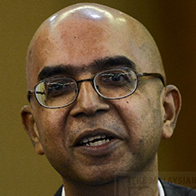Who believes the government? After all, the government said Datuk Seri Khairuddin Abu Hassan committed a security offence when he made police reports against 1Malaysia Development Berhad (1MDB).
 One of the many criticisms of the National Security Council Bill is that it is vague about what constitutes a threat to security.
One of the many criticisms of the National Security Council Bill is that it is vague about what constitutes a threat to security.
The government has said the prime minister will restrain himself: he won’t call anywho disagree with him a threat and array all the nation’s powers against them. Who believes the government?
When I was asked why the government introduced the bill, I said the government is probably preparing to address secession threats.
I recalled politics 101. When the government is weak, those who gave up power will seek to recover it; those who aspire to power will seek bargains.
To scare others who crave power, the government must acquire and brandish power. It must have a set of crises it can roll out so it can call the people to “unite” against them.
Many crises can be deployed at an instant’s notice. The ones which are continuously tested are “greedy Chinese,” “evangelising Christians” and “angry Malays”.
But the real threat is secession. Calls for secession have been voiced in the south of the peninsula and in the Bornean states.
Thinking about secession made me recall Stephen Kalong Ningkan, who was appointed chief minister of Sarawak in July 1963.
He considered the federal government meddlesome. He was suspicious of Sarawak politicians who spent time in Kuala Lumpur.
When Singapore left the Federation of Malaysia in August 1965, Ningkan’s eyes gleamed.
For the peninsula, Singapore’s departure had a plus: it was “good riddance to the Chinese”. But Sarawak’s departure would be a minus: the Chinese voice would increase.
So, the federal government took action to remove Ningkan.
In June 1966 the Federal Minister for Sarawak affairs got 21 of 42 Sarawak state assemblymen to sign a letter stating that they no longer had confidence in Ningkan. (I suppose it was too costly to get a 22nd signature.)
The letter was used to tell the Sarawak governor to ask Ningkan to resign together with his Supreme Council.
The governor asked. Ningkan refused.
Ningkan told the governor that at a meeting of the state assembly just days earlier there was no indication a majority had no-confidence in him.
He said the assembly should convene and decide. He said he would abide by the assembly’s decision.
The governor refused. He dismissed Ningkan and his Supreme Council.
Ningkan went to court. The court agreed with Ningkan that the state constitution did not give the governor the authority to dismiss the chief minister under any circumstances.
Professor H P Lee, the distinguished Australian legal scholar, says this “had grave ramifications for constitutionalism in Sarawak”.
By the time of the judgment, 25 assemblymen were said to oppose Ningkan. Ningkan refused to submit a vote of no-confidence to the assembly.
Ningkan called on the governor to dissolve the assembly and call for a fresh election. The governor refused. The nation was at a legal impasse. It was a constitutional crisis.
The federal government got the Yang di-Pertuan Agong to proclaim an emergency in Sarawak. Parliament amended the constitution. The governor received power to dismiss the chief minister and his Supreme Council.
On September 23, 1966, the governor summoned the state assembly. The assembly passed a vote of no-confidence. The governor dismissed Ningkan.
Ningkan took to the courts. The courts ruled (up to the Privy Council) against him.
Lee concludes his (2007) review of the Ningkan saga with this paragraph:
“Although the Malaysian Constitution is federal in nature, the Ningkan cases indicate the relative ease with which a determined central government can exercise control over the component States. As a last resort, a federal government can draw on the emergency powers embodied in Article 150 to empower it to modify a State constitution, albeit of a temporary duration.”
Under Article 150(7), the amendments expire six months after termination of the emergency.
So, since the federal government already has so much power, why did it introduce the NSC Bill? Who believes the government? We can only speculate. – December 24, 2015.
* This is the personal opinion of the writer or publication and does not necessarily represent the views of The Malaysian Insider.


Comments
Please refrain from nicknames or comments of a racist, sexist, personal, vulgar or derogatory nature, or you may risk being blocked from commenting in our website. We encourage commenters to use their real names as their username. As comments are moderated, they may not appear immediately or even on the same day you posted them. We also reserve the right to delete off-topic comments